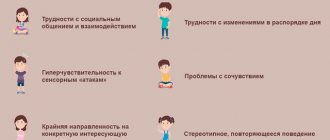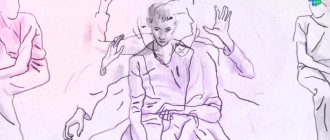...But there is such hidden power in memory, Which brings back images and multiplies... The noise, without stopping, memory is rain, And memory is snow, it flies and cannot fall. David Samoilov “Memory”
The disorder that will be discussed is significant for doctors in a number of specialties: neurologists, resuscitators, neurosurgeons. Although psychiatrists primarily treat Korsakoff syndrome.
This disorder is important to me for another, personal reason. It just so happened that my first patient suffered from this very disease. Well, the first patient for any doctor is like the first love - he is never forgotten.
I will briefly describe this episode - for greater clarity of the story. A 56-year-old alcoholic man was admitted to the psychosomatic department. Unshaven, disheveled, confused, he willingly made contact, but in conversation it was impossible to get anything reasonable from him. A person has been abusing alcohol for many years, drinking continuously for several months (denying himself literally all other joys, including food, for the sake of the “little white one”). When, finally, the opportunity to become an alcoholic ended, the friend came to work, but behaved so strangely that his colleagues (aka drinking buddies) called an ambulance. Nikolai, let’s call him that, did not refuse treatment, especially since at that moment he completely ceased to understand where he was and what was happening. I prescribed treatment to prevent delirium tremens, which, apparently, was beginning, and naively hoped for a speedy recovery for my client. Not so. No, Nikolai’s terrible delirium never fully developed. Consciousness was quite clear, there were no hallucinations, and subjective well-being quickly improved. However... As the gift of speech returned to the ward, it became clear that he did not remember anything. Nothing at all. Not my name, not the dish I had just eaten with gusto for breakfast, not even my bed in the room. And during the morning rounds he told me with pleasure how “yesterday he took part in the battle on the Kursk Bulge.” Kolya enthusiastically described the battlefield, tanks, explosions. Suddenly he asked to call his son for an “important conversation” - and pointed to the legless old man in his ward. This is how I became acquainted with Korsakoff's syndrome.
Amnestic (Korsakoff) syndrome is a psychopathological complex most often associated with brain damage in patients with alcoholism caused by vitamin B1 (thiamine) deficiency. It manifests itself as loss of memory for current events (fixational amnesia) with relative preservation of memory and skills of the past. Amnestic disorientation in time and surroundings, paramnesia in the form of substitute confabulations of everyday content are observed.
Sergei Sergeevich Korsakov (January 22, 1854 - May 1, 1900) - an outstanding Russian psychiatrist, one of the founders of the nosological trend in psychiatry and the Moscow scientific school of psychiatry, the author of the classic "Course of Psychiatry", one of the founders of the experimental psychological laboratory in Moscow.
In the specialized literature, in addition to the main name (Korsakoff syndrome), the following are often mentioned:
- Korsakov's syndrome;
- amnestic alcoholic syndrome;
- Korsakoff psychosis;
- syndrome in Gaye-Wernicke encephalopathy.
This specific mental disorder was first described by Russian psychiatrist Sergei Korsakov in 1887.
In 1876, he began work on his dissertation “On Alcoholic Paralysis,” which he defended 11 years later. Korsakov described a very common disease of alcoholics - damage to the peripheral nerves was combined with impairments of memory and spatial-temporal orientation. In 1897, at the XII International Congress of Doctors, which was opened by Alexander III at the Bolshoi Theater and where, in front of more than 8 thousand clinicians and scientists from all over the planet, the great German naturalist Rudolf Virchow exclaimed: “Learn from the Russians!”, the disease described by Korsakov was unanimously awarded international name for "Korsakov's syndrome".
The importance of this syndrome for medical science is difficult to overestimate. Having described the causes of the disease, the phases of development, and characteristic disorders in the body, Korsakov identified it as an independent nosological unit. Previously, various mental illnesses were considered as varieties of a single psychosis. Korsakoff's syndrome was one of the first mental disorders in which organic lesions of the nervous tissue were discovered. Thus, it was confirmed that psychoses are based not on some “moral” deviations, but on neurobiological disorders.
Reasons for development
The main cause of Korsakoff syndrome is a lack of vitamin B1 (thiamine). Most often, Korsakoff syndrome occurs due to alcoholism, but sometimes amnesic syndrome can occur after serious injuries or brain hypoxia, or due to persistent malnutrition.
Long-term alcohol abuse causes a deficiency of thiamine in the body due to impaired absorption. As a result, acute Wernicke encephalopathy develops: delirium (delirium tremens), gait ataxia and other neurological disorders. If a chronic alcoholic, especially in a state of acute encephalopathy, does not receive full and timely treatment, then in approximately 85% of cases Korsakoff amnestic syndrome or Korsakoff psychosis develops.
Korsakoff syndrome is also observed in many neurological diseases. These are brain tumors and infarctions, traumatic brain injury, herpetic encephalitis, limbic encephalitis, degenerative dementias: Alzheimer's disease and Pick's disease. There are cases when the syndrome develops as a consequence of surgery on the temporal lobe to treat epilepsy.
What all these diseases have in common is bilateral damage to one or more limbic structures - deep and evolutionarily ancient areas of the brain.
Knew, but forgot
Amnestic aphasia is characterized by the inability to use long-known words. The person has preserved hearing and intelligence, he understands what is said well and speaks clearly himself, but there are frequent pauses in his speech. He replaces words with inappropriate meanings, and sometimes with just invented ones. Sometimes it is possible to remember a word only with the help of loved ones or a speech therapist. The patient says: “This is what they eat”, he is upset that he cannot name the object, but after the first syllable “lo” he remembers: “Spoon!” The signs of amnestic aphasia resemble the stage of speech formation, when the child still has a poor active vocabulary. But the causes of the disease are completely different.
Symptoms of Korsakov's syndrome
In Korsakov's syndrome, negative symptoms (amnesia) and productive symptoms (paramnesia) are closely intertwined.
Oliver Sacks, an American neurologist and neuropsychologist, in one of the chapters of his bestseller “The Man Who Mistook His Wife for a Hat and Other Stories from Medical Practice” builds a figurative theory of what is happening to the patient:
“Each of us has his own story, his own internal narrative, the continuity and meaning of which form the basis of our life... Deprived of the continuity of personal history and stable memories, the patient is driven to narrative frenzy, and hence all his endless inventions and eruptions of words, all his myth-making... the patient in Literally, I have to invent myself and the rest of the world every minute...”
Mandatory symptoms of Korsakov's syndrome are:
- Fixation amnesia. With Korsakov's syndrome, all events of the present and recent past pass by the patient without lingering in memory. Memories of events from youth or childhood are retained. The memory stores everything that happened before the illness (for example, the patient can calmly remember the names of his classmates). But then there is a white canvas on which memory distortions (Korsakov’s paramnesia) occur. Fixation amnesia sometimes manifests itself so intensely that the patient loses the ability to learn, does not tolerate house changes, the appearance of new people, and especially moving to a new place. Such a traumatic event can push the patient towards Korsakoff psychosis.
- Amnestic disorientation. Not only concerns time and space, but also touches on basic life skills. A person simply does not understand where he is and where he needs to go. Therefore, most often the sick person turns out to be completely helpless and cannot live without support and care. In the case of Korsakoff's syndrome, pronounced anosognosia (loss of criticality to the condition) is also observed.
- Paramnesia. There are three types of Korsakoff syndrome:
- Confabulations (from the Latin confabulari - “to chat”, “to tell”) are fictitious memories with which the patient unconsciously fills in the gaps in memory. They are often fantastic in nature. To the question: “Where were you yesterday?” - the patient may answer that he traveled in space, visited other countries, was in a war. This disorder is also called “honest lying” because patients do not want to deceive and are often unaware that their information is false. In conversation, patients speak very confidently about their memories, despite evidence that disproves their truth. These memories can be consistent, very complex and detailed.
- Most often, with Korsakov's syndrome, substitute confabulations occur (similar to the reality surrounding the patient). If they take on a fantastic appearance, we can talk about the development of Korsakov psychosis.
- Cryptomnesia. Situations in which what you once read or saw is perceived as part of your own life, or, conversely, your own life seems like an episode of a book or film. A person cannot remember when this or that event happened, whether he wrote a poem or simply remembered something he once read, whether he was at a concert of a famous musician or just heard a conversation about it. The source of this or that information is forgotten. Someone else's ideas and someone else's creativity, once perceived by a person, after some time are recognized as their own.
- Pseudo-reminiscences are a displacement in time of events that actually took place in the patient’s life. They also fill gaps in memory for current events. The past is presented as the present. Patients, when talking about current events, report facts that happened at another time. Pseudo-reminiscences, as a rule, contain events of ordinary life, which the patient speaks about in an ordinary and believable manner. Answering the same question: “What did you do yesterday or the day before?” - the patient may answer that he went fishing (on a business trip, vacation).
- Additional signs of amnestic syndrome are: decreased will, anxiety, confusion, euphoria, inactivity, as well as emotional instability. Patients can be either uninitiative or, on the contrary, fussy. Depending on the causes and location of the lesion, visual field defects, disturbances in eye movements, and coordination of movements may also be observed. But in many cases, there are no neurological symptoms - sometimes this leads to an erroneous diagnosis of mental illness and improper treatment of a patient with a traumatic brain injury or herpetic encephalitis.
The dynamics of Korsakoff's syndrome may be regressive, stationary (symptoms remain unchanged for many years) or progressive (Korsakoff's psychosis).
With Korsakov psychosis: the patient is completely disoriented in space and time, does not recognize those around him, individual hallucinations and unstable delusional ideas arise, which are immediately forgotten.
Remember all!
Disturbances in amnestic aphasia require coordinated work of a team of doctors and defectologists. The baby’s family also needs to get involved. The main thing is to do it right. After all, the task is to build new connections to replace the lost ones, which means that you won’t achieve much by simple repetition. The image of an object is made up of a set of factors, and the task of adults is to connect as many of the child’s sensations as possible. Is the baby unable to remember the word “spoon” because the connection between the visual image and the name of the object is broken? It doesn’t matter, because you can use a spoon:
- touch,
- twirl in your hands
- lick
- listen to her fall to the floor
- smell.
One of the familiar sensations may well turn out to be the key to a forgotten word and will tell specialists possible ways of rehabilitation. The child’s brain is plastic, and when the cause of forgetting words is eliminated, it builds up new connections quite quickly. Especially if you give it support in the form of a dosed load, which will stimulate the activity of various zones.
Diagnosis and difference from other ailments
Here is what Dr. Oliver Sacks wrote in the mentioned book about a case of unfavorable development of the disease: “...Mr. Thompson’s memory is completely destroyed, but the true essence of the catastrophe that befell him lies elsewhere. Along with his memory, the fundamental ability to experience was lost, and it was in this sense that he lost his soul.”
The diagnosis is made based on signs indicating vitamin B1 deficiency. To do this, a blood test is taken, as well as a liver function test. Diagnosis also includes a general examination, after which intravenous administration of vitamin B1 is prescribed. But still, the main symptom of Korsakoff's syndrome when making a diagnosis is memory problems against the background of chronic alcoholism. To identify them, medical psychologists or psychiatrists use a word memory test, as well as other psychological tests for mechanical and voluntary memorization.
Pathomorphologically (at autopsy), damage to the deep parts of the brain is determined: a structural deficit in the brainstem and diencephalic regions, as well as bilateral damage to at least one limbic structure.
Since Korsakoff's disease occurs not only with alcohol consumption, it should be distinguished from other alcohol-induced syndromes of damage to the nervous system (dementia, delirium), as well as from amnestic mental disorders not caused by alcohol intake (memory impairment in dementia or delirium, in organic lesions or diseases non-alcoholic brain; dissociative amnesia; memory dysfunction in depressive disorders).
Content:
- Factors that influence memory loss after drinking alcohol
- Why does memory loss develop after drinking alcohol?
- Classification of the disorder 3.1 Total 3.2 Lacunar 3.3 Korsakoff syndrome
- Alcohol amnesia - treatment
Narcologists talk about alcohol amnesia if the morning after drinking alcohol a person realizes that he does not remember everything he said and did yesterday.
Doctors also call this phenomenon “patchwork memory.” Often entire fragments are “erased,” and then it is impossible to establish the sequence of events without the help of witnesses. Memory loss after alcohol is explained by the destruction of neural connections by toxic metabolites of ethanol. Due to high doses of alcohol, the normal process of transmitting nerve impulses becomes impossible, and the preservation of the information received is disrupted.
Scientists have found that low doses of alcohol actively stimulate the nervous system and speed up the thinking process. Therefore, with a mild degree of intoxication, when the concentration of alcohol in the blood is less than one ppm, difficulties with memories do not arise. If the alcohol concentration exceeds the specified value, the central nervous system is gradually depressed. This is manifested by slow thinking, impaired coordination of movements and decreased concentration.
Treatment of Korsakov's amnestic syndrome
Treatment of amnestic syndrome is aimed at eliminating its cause (most often brain damage due to alcoholism). Typically treatment involves detoxification with high doses of thiamine and other vitamins; nootropic drugs are used, thereby improving memory, attention, and learning ability. Pharmacotherapy against agitation and anxiety also helps. For psychosis, antipsychotics are often used in small doses.
Treatment of such an ailment as Korsakoff's syndrome is effective to a relative extent: success depends on the age and general condition of the patient, alcohol experience, and level of social adaptation.
The memory defect during therapy may smooth out over time, but may remain unchanged, or, if the disease progresses, retrograde amnesia is added to fixation amnesia, that is, for events of the past. Unfortunately, many of our patients are characterized by enviable tenacity with which they resist treatment and concern for their fate.
Fortunately, Korsakoff syndrome has become a rather rare phenomenon in drug treatment and psychiatric practice, since modern treatment of alcoholism involves the administration of B vitamins, which is a kind of preventative measure for Korsakoff syndrome. However, the relevance of Korsakov amnestic syndrome in Russia and the world still remains. Reading the work of Sergei Korsakov himself at one time, I had an excellent opportunity to verify that the symptoms of this disorder, brilliantly described by the author a century ago, have not changed at all.
Psychogenic amnesia
Conditions that lead to the loss of memory of a certain part of data about one’s personality are called psychogenic. These types of amnesia include:
- Katathimnaya. The patient forgets only those data that are in some way related to psycho-emotional experiences.
- Hysterical. Often observed in hysterical psychopathic syndrome. In this case, the person cannot remember only the traumatic moment.
- Post-hypnotic. The patient is unable to reproduce what happened to him in a trance state. This is usually part of the suggestion.
- Dissociative. Refers to the body's protective reactions that do not allow the destruction of mental functions. Memory for events that cause severe stress is erased. It differs from other types of psychogenic amnesia in that the loss itself is a treatment and relief from further problems.
- Dissociative fugue. Also refers to defense mechanisms, but at the same time a person escapes from a difficult situation by moving to another city and forgetting about his past life and his personality. At the same time, he retains his basic skills completely. After some time, events are restored, usually this happens suddenly and immediately.








